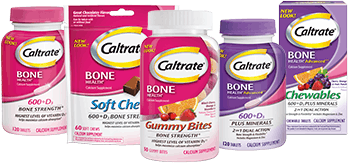BONE HEALTH AND CALCIUM ARTICLES
Take an active role in your bone health. Tap into a hub of information on calcium and other bone-essential nutrients, plus guidance on how to help reduce the risk of osteoporosis at any age, and much more.
FEATURED ARTICLE
Trust calcium supplements to help fill your nutritional gap
New research shows calcium supplements are safe in helping you to meet your nutritional needs when you aren't getting what you need via diet.
THE STORY OF YOUR BONES: CALCIUM AT EVERY AGE
Calcium plays a key role throughout each stage of your life. Find out what your calcium needs are.
CALCIUM & VITAMIN D: SUPPORTING YOUR BONE HEALTH
You probably know that calcium is important to your bone health. But did you know that vitamin D plays a crucial role, too? In fact, not getting enough vitamin D may reduce the calcium absorbed from food alone.
CALCIUM CARBONATE VS CALCIUM CITRATE
Not all calcium forms are the same. Calcium supplements are generally made from two sources of elemental calcium.
OSTEOPOROSIS: HELP REDUCE THE RISK
Find out how much calcium your body needs based on your age, gender, and other factors. Then calculate whether you’re getting enough from diet alone.
THE SURGEON GENERAL’S REPORT ON BONE HEALTH
Bone Health and Osteoporosis:
A Report of the Surgeon General (PDF 1.5MB)
VITAMIN D: WHAT YOU NEED TO KNOW
What is Vitamin D? As nutrients go, Vitamin D is in a class by itself. That's because vitamin D is actually a hormone that the body produces in response to direct exposure of skin to direct Ultraviolet B (UVB) rays from the sun. Vitamin D is classified as a fat-soluble vitamin, which means that vitamin D you make and what you consume from foods and dietary supplements is stored in fat tissue for later use.

VITAMIN D DEFICIENCY
Vitamin D deficiency is far more common in the U.S. than many people realize.
BENEFITS OF VITAMIN D3
Vitamin D helps maximize your body’s ability to absorb calcium you take in from foods and supplements. It also regulates calcium’s movement into, and out of, your bones in order to maintain calcium levels throughout the body. Without enough vitamin D circulating in your bloodstream, absorption of adequate calcium is difficult.



